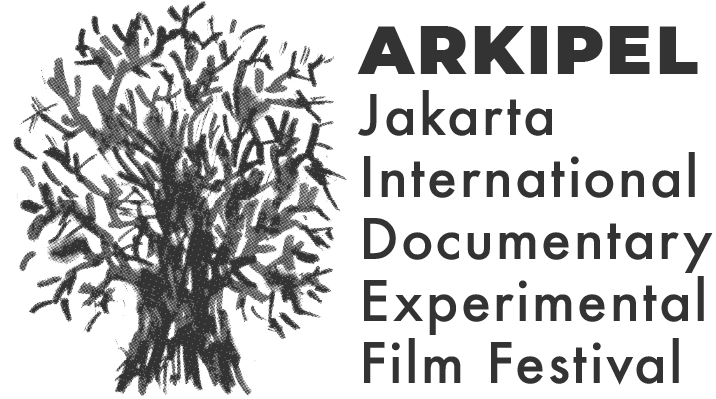Presentasi Spesial 3: Mengurai Arsip, Membaurkan, Ulangi
Pada penayangan ketiga di hari ketiga ARKIPEL Catch-22 – 9th Jakarta International Documentary and Experimental Film Festival, gedung Forum Lenteng diiringi hujan. Penonton ramai berkumpul pada hari Minggu, 27 November 2022.
Malam itu, ARKIPEL menayangkan empat filem yang dikurasi oleh Abhishek Nilamber dan Laura Kloeckner, peneliti dan kurator di SAVVY Contemporary. Kurasi ini adalah bagian dari proyek United Screens, sebuah proyek yang digagas oleh SAVVY Contemporary, berkolaborasi dengan Wekalet Behna (Mesir), AVEC – L’Association de Volontariats, Échange Culturel et Action des Jeunes (Tunisia), NAAS – Network of Arab Alternative Screens (Lebanon), Estación Terrena (Colombia), dan ARKIPEL – Jakarta International Documentary and Experimental Film Festival (Indonesia). Acara dimulai pada jam 19:00 dan berakhir pada jam 21:14.
Dengan judul Listen to the Beats of Our Images* : Un-archive, remix, rebeat, acara ini dimoderasi oleh Luthfan Nur Rochman yang membuka dan membawakan sesi tanya jawab beserta Laura Kloeckner dan Abhishek Nilamber. Filem yang ditayangkan secara berurutan adalah Listen to the Beat of Our Images (2020, Audrey Jean-Baptiste & Maxime Jean-Baptiste), Las Picapederas/The Stonebreakers (2021, Azul Aizenberg), Festina Lente (2021, Baya Medhaffar), dan Golden Jubilee (2020, Suneil Sanzgiri).
Menurut Abhishek, filem-filem ini menerapkan metode gunting-tempel (“cutting and pasting”) terhadap arsip-arsip filem dan suara. Dalam upaya mensubversi dunia yang eurosentrik, visual filem disajikan dengan suara yang menyorot kekonyolan kolonial. Ini diungkapkan dalam beberapa bagian, salah satunya dalam filem The Stonebreakers di mana muka pewawancara yang berkulit putih ditutupi dan kemudian dimunculkan pada akhir cuplikan secara komedik. Penonton di sekitar saya tertawa dan berempati pada kesan subversi atau penarikan makna dari cuplikan arsip yang ditayangkan. Kesan ini juga terasa pada sesi tanya jawab. Percakapan antara kurator, moderator, dan penonton menekankan aspek subversi, bahwa aksi subversi adalah untuk menetapkan konteks dunia mereka untuk belajar akan diri mereka sendiri. Kesan subversi tidak hanya dilakukan secara jenaka, tetapi secara lurus dan terang membuka lapisan arsip secara sentimental atau menunjukan perspektif yang mendampingi konteks arsip yang berbeda.
Ada beberapa pertanyaan setelah penayangan berakhir. Hafiz Rancajale, direktur artistik ARKIPEL, bertanya tentang ketertarikan generasi muda terhadap arsip akhir-akhir ini. Abhishek menghubungkannya dengan pengalaman masa kecilnya yang tumbuh dengan MTV dan hiburan-hiburan Barat lainnya. Arsip adalah salah satu cara untuk belajar tentang asal-usul dan diri mereka sendiri. Afrian Purnama, penulis dan kurator, bertanya mengenai kecenderungan filem-filem arsip dalam program ini untuk menggunakan voiceover, dan tentang penggunaan estetika retro terhadap filem-filem masa kini. Baginya, poin kedua ini problematis, karena mengacaukan “keaslian” waktu dalam konteks arsip tersebut. Laura berspekulasi, mungkin itu karena arsip dipandang sebagai suatu kebenaran absolut, maka penggunaan voiceover bisa menjadi cara untuk me-reapropriasi arsip-arsip tersebut dan membuat kebenaran baru.
Selain itu, Abhishek juga berbicara tentang bagaimana aspek teknologi juga disorot melalui karya-karya ini, dalam bagaimana metadata atau konteks yang mengelilingi arsip tersebut dapat didapatkan secara bebas, bebas seperti informasi yang open source. Laura menambahkan, kurasi ini juga berupaya membayangkan masa depan ‘baru’ (“pretense of the future”) yang menegasi arsip sebagai kebenaran absolut. Filem-filem ini membuka jalan untuk melakukan dekonstruksi konteks bukan hanya merekonstruksi interpretasi tertentu. Acara dilanjutkan dengan percakapan yang lebih santai di luar ruang penayangan.
Special Presentation 3: Un-archive, Remix, Rebeat
At the third screening on the third day of ARKIPEL Catch-22 – 9th Jakarta International Documentary and Experimental Film Festival, Forum Lenteng’s building was accompanied by rain, filled with spectators, on Sunday 27 November 2022. ARKIPEL was screening four films curated by Abhishek Nilamber and Laura Kloeckner, researchers and curators at SAVVY Contemporary. This curation is part of the United Screens project, initiated by SAVVY Contemporary, in collaboration with Wekalet Behna (Egypt), AVEC – L’Association de Volontariats, Échange Culturel et Action des Jeunes (Tunisia), NAAS – Network of Arab Alternative Screens (Lebanon), Estación Terrena (Colombia), and ARKIPEL – Jakarta International Documentary and Experimental Film Festival (Indonesia). The event starts at 19:00 and ends at 21:14.
Listen to the Beats of Our Images* : Un-archive, remix, rebeat was moderated by Luthfan Nur Rochman who opened and hosted a Q&A session along with Laura Kloeckner and Abhishek Nilamber. The films shown in order are Listen to the Beat of Our Images (2020, Audrey Jean-Baptiste & Maxime Jean-Baptiste), Las Picapederas/The Stonebreakers (2021, Azul Aizenberg), Festina Lente (2021, Baya Medhaffar), and Golden Jubilee (2020, Suneil Sanzgiri).
According to Abhishek, these films apply the cutting and pasting method to archives of films and sounds. Attempting to subvert the eurocentric world, the film’s visuals are presented with sound that illuminates the silliness of colonialism. This is expressed in several parts, one of which is in The Stonebreakers where the white interviewer’s face is covered and then revealed at the end of the trailer in a comedic manner. The audience around me laughed and empathized with the sense of subversion or suspension of meaning from the archive footage shown. This impression was also felt during the Q&A session. Conversations between the curator, moderator and audience emphasize the aspect of subversion, that the act of subversion aims to set the context of their world in order to learn about themselves. The impression of subversion is not only carried out in a humorous manner, but in a straight and clear manner opening layers of archives sentimentally or showing perspectives that accompany different archival contexts.
Several questions were asked after the screening ended. Hafiz Rancajale, artistic director of ARKIPEL, asked about the recent interest of the younger generation in archives. Abhishek relates it to his childhood experiences growing up with MTV and other Western entertainment. Archives are a way to learn about their origins and themselves. Afrian Purnama, writer and curator, asked about the tendency of archival films in this program to use voiceover, and about the use of retro aesthetics for contemporary films. For him, this second point is problematic, because it confuses the “authenticity” of time in the context of the archive. Laura speculates, maybe it’s because archives are seen as absolute truth, so the use of voiceover could be a way to reappropriate these archives and create “new” truths.
Apart from that, Abhishek also talks about how the technological aspect is also highlighted through these works, in how the metadata or context surrounding the archive can be obtained freely, like an open source of information. Laura added, this curation also attempts to imagine a pretense of the future which negates archives as absolute truth. These films pave the way for deconstructing contexts, not just reconstructing certain interpretations. The program continued with a more casualrelaxed conversation outside the screening room.







